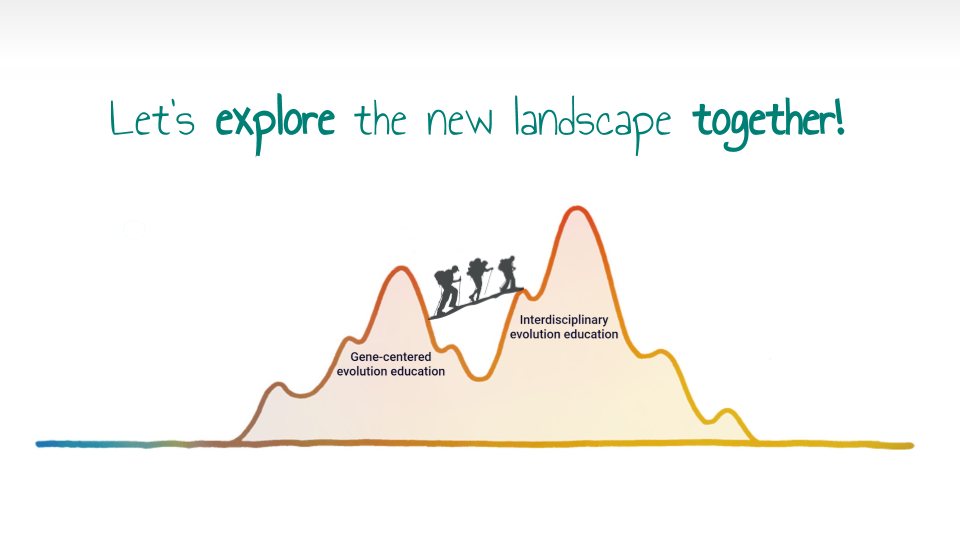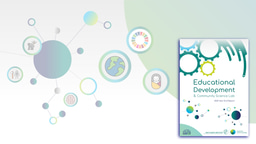Climbing a new peak in evolution education
Published in Neuroscience

By Dustin Eirdosh & Susan Hanisch
When we begin one of our evolution-focused teacher education courses at the University of Leipzig, among the first things we do with students is reflect on our individual and collective understanding of the concept of evolution itself. What is evolution? What characterizes evolution? What kinds of things can be said to evolve? Our classes tend to have pre-service teachers from a wide range of different subject areas, so we get a wide range of responses. We might get everything from "Evolution is a change in allele frequency within a population of organisms", to the far more general "Well, almost everything can be said to 'evolve'".
How should a teacher educator engage these responses? More so - if we don't get these future educators on more common ground, how might this diversity of evolution understanding among teachers impact the evolution understanding of students in that school?
It turns out, the evolution education research community is far from having a consensus view on these questions. We have previously described that, when evolution education experts support a gene-centered evolution education, that is, when they adopt the view that a change of gene frequency is the only legitimate process deserving the conceptual title of evolution, then we are climbing the wrong mountain. Limiting student conceptions of evolutionary processes to that of genetic change is scientifically inadequate, and conceptually problematic (see Hanisch & Eirdosh 2020a,b). Equally so, sloppily generalizing evolutionary concepts to that point that "almost everything can be said to evolve", is also unlikely to be helpful or scientifically adequate.

What we need is a deeper conceptual clarification of the core (and peripheral) concepts of evolution science (e.g. variation, selection, inheritance, population thinking, decentralized causation, etc.), as they apply across different levels (e.g. both within and between organisms) and domains (e.g. genetics, behavior, cognition, and culture). Evolution education, and the education research that informs it, needs new tools and scientific infrastructure for engaging students in understanding human origins, diversity, and flexibility through the lens of evolution as the interdisciplinary science that it is.
That is the aim of the OpenEvo network, an initiative from the Department of Comparative Cultural Psychology at the Max Planck Institute for Evolutionary Anthropology, aiming to evolve an open, networked, and interdisciplinary evolution education research community.
The OpenEvo network structure is inspired by the sociocratic model of governance, and the network has begun to identify and organize around four global Organizing Circles. This minimal structure aims to enable teacher educators and education researchers to also form regional or special-interest sub-circles, thus supporting locally relevant projects and effective collaboration.
.png)
Within these circles, a range of practical projects are beginning to emerge in order to support our climb up to the highest peaks of the interdisciplinary evolution education landscape.
.png)
What can you do?
We welcome teachers from all subject areas, teacher educators, education researchers, interdisciplinary evolution scientists, interdisciplinary human scientists, and philosophers of evolution to join OpenEvo in any way that meets your interests.
- Visit the OpenEvo project page at MPI-EVA
- View the slides from the meeting
- Get involved with OpenEvo, either as a general Member-at-Large (free and no strings or commitment other than supporting our vision for evolution education), or as a more active role in one of our Organizing Circles.
- Contact Dustin Eirdosh for more information or to discuss collaborations for your teacher education group.
References
Hanisch, S. & Eirdosh, D. (2020a). Educational potential of teaching evolution as an interdisciplinary science. Evolution: Education and Outreach, 13 (25). https://doi.org/10.1186/s12052-020-00138-4
Hanisch, S. & Eirdosh, D. (2020b). Causal Mapping as a Teaching Tool for Reflecting on Causation in Human Evolution. Science & Education. https://doi.org/10.1007/s11191-020-00157-z
Cover image for post from Orlando Vera
Follow the Topic
Your space to connect: The Psychedelics Hub
A new Communities’ space to connect, collaborate, and explore research on Psychotherapy, Clinical Psychology, and Neuroscience!
Continue reading announcement




Please sign in or register for FREE
If you are a registered user on Research Communities by Springer Nature, please sign in